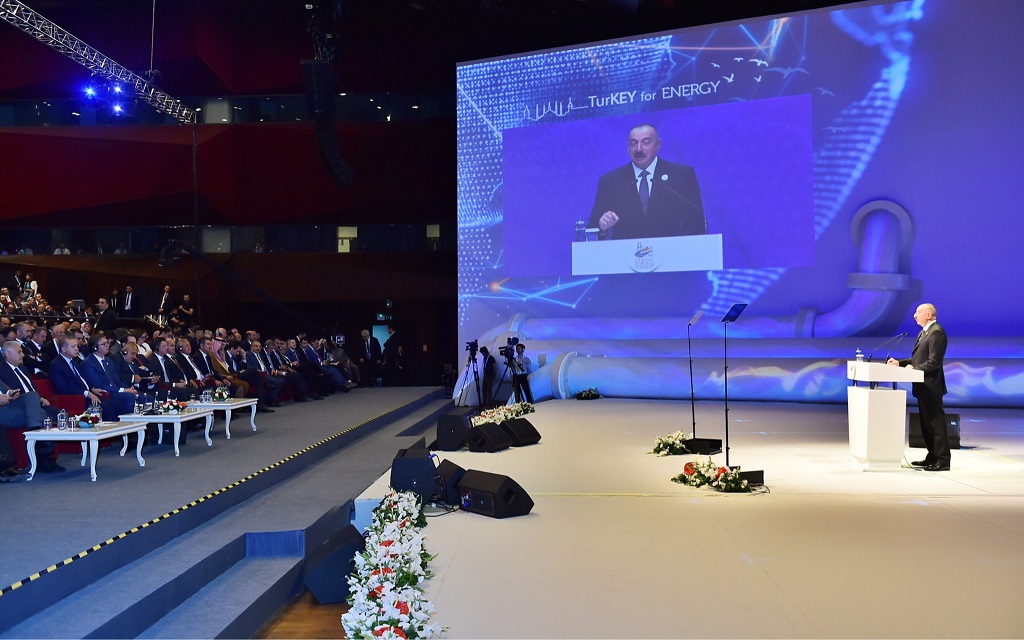The Eurasian energy mega-project known as the Southern Gas Corridor is in the spotlight this week, as world leaders and executives are gathered in Istanbul for the 22nd World Petroleum Congress (WPC), one of the largest oil and gas conferences.
“The Southern Gas Corridor project will become profitable in the long-term period for the energy sector of Azerbaijan, Turkey and Europe,” Rovnag Abdullayev, President of the State Oil Company of the Azerbaijan Republic (SOCAR) said at the WPC on Sunday. “Azerbaijani gas, together with other sources, will play an important role in meeting Europe's demand for natural gas.”
Known as the “Olympics of the oil and gas industry,” the WPC addresses the future of the oil industry, natural gas resources, global policies regarding energy efficiency, infrastructure, and investment opportunities, and low carbon emissions. Representatives from 100 countries and 1,500 companies are in attendance at this year’s WPC, headlined “Bridged to Our Energy Future, which runs from July 9-13.
While in attendance for the WPC, Azerbaijan’s President Ilham Aliyev met with his Turkish counterpart at the presidential Tarabya Mansion Istanbul, where the two discussed the status of the Trans-Anatolian Pipeline (TANAP), the middle segment of the Southern Gas Corridor.
Running 1,800 kilometers across Turkey, TANAP will deliver around six billion cubic meters (bcm) of gas to Turkey, from an overall 16 bcm transported annually through the Southern Gas Corridor. More than 70 percent of the pipeline has already been constructed, and the first batch of natural gas will be delivered to European consumers in 2020, after TANAP’s precursor, the South Caucasus pipeline, and the Trans-Adriatic Pipeline (TAP), stretching through Greece and Albania, are complete.
The EU is heavily dependent on natural gas imports, and long-term energy security has proven to be a challenge for Europe as it looks for alternatives to those provided by Russia.
The Caspian littoral countries of Azerbaijan, Kazakhstan and Turkmenistan have become increasingly important for Europe thanks to large reserves of natural gas underneath the Caspian Sea. Together with Iran and Russia, two other Caspian littoral states, and nearby Uzbekistan, the region is estimated to contain 48 billion barrels of oil and 292 trillion cubic feet (Tcf) of natural gas in proved and probable reserves. The US Geological Survey estimates there exists an additional 20 billion barrels of oil and 243 Tcf of natural gas thus far undiscovered.
“Projects such as the Southern Gas Corridor and the EastMed (Israel-Cyprus-Greece-Italy) underwater pipeline project will allow Europe to diversify its energy sources, thereby improving its energy security,” US Secretary of State Rex Tillerson said at the WPC.
Europe’s energy dependence in 2014 was over 53 percent of its total demand, meaning more than half of the continent’s energy supply was imported from outside of its borders, according to data compiled in 2016 by Eurostat, the European Union’s (EU) statistical office. Since 2004, overall European energy dependency has not dipped below 50 percent.
Azerbaijan, located on the western edge of the Caspian Sea and bordered with Russia to North and Iran to South, owns 2.55 trillion cubic meters of gas, while its oil reserves are estimated at 7 billion barrels, according to data compiled by the US government.
Azerbaijan’s largest offshore gas field, Shah Deniz II, contains an estimated 1.2 trillion cubic meters of natural gas and 240 million tons of gas condensate reserves. The field will generate 16 billion cubic meters of gas per year that will travel through the Southern Gas Corridor, which is valued at $45 billion.







 The Mine Action Agency of Azerbaijan (ANAMA) reported on Thursday the discovery of a significant amount of explosives in the Khojavand district of ...
The Mine Action Agency of Azerbaijan (ANAMA) reported on Thursday the discovery of a significant amount of explosives in the Khojavand district of ...
 Iran has refuted reports of alleged damage to Shimon Peres Negev Nuclear Research Centre located southeast of Dimona, Israel, during the recent air...
Iran has refuted reports of alleged damage to Shimon Peres Negev Nuclear Research Centre located southeast of Dimona, Israel, during the recent air...
 Iran’s Foreign Minister, Hossein Amir-Abdollahian, has labeled a foiled Israeli drone attack in certain parts of the country as a "failure" for Isr...
Iran’s Foreign Minister, Hossein Amir-Abdollahian, has labeled a foiled Israeli drone attack in certain parts of the country as a "failure" for Isr...



